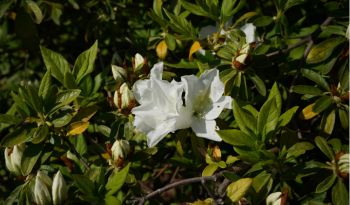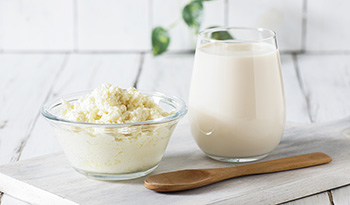Lung Cleanse: Natural Ways To Detox Your Respiratory System

Detoxing isn’t just for the gut.
Whether wishing to recover from years of smoking or as a way to improve overall health, many individuals are now turning to ways to improve lung function.
One possible way to keep lungs functioning optimally is to support them through a lung cleanse or detox.
What Is A Lung Cleanse?
A lung cleanse is a protocol that helps support healthy lung function. Lung cleanses or detox methods vary widely. Some may include a detailed regimen of herbal preparations, dietary changes, and lifestyle practices, while others may be as simple as drinking an herbal tea or practicing intentional breathing.
Although the lungs have powerful self-healing capabilities naturally, there is a growing desire to support lung health with a holistic approach.
While holistic approaches may help improve and support lung function, some may wonder whether a lung cleanse is necessary.
Why Detox The Lungs?
Detoxing the lungs is one way to remove excess burden from the lungs and help support healthy lung function. With the increase in environmental pollution, food sensitivities, household irritants, and allergens, optimizing lung health becomes more of a necessity than before.
According to the American Lung Association, lung function begins to decline gradually at age 35. It is paramount to keep your lungs healthy to be vital and active well into your older years.
A lung cleanse may help you reach this goal.
Detoxing the respiratory system may have many benefits, including helping improve breathing, promoting relaxation, reducing stress, lowering inflammation, and reducing the frequency and duration of respiratory tract infections.
Some of the most common lung detox methods include herbs, natural substances, and steam inhalation.
Herbs That May Help Detox The Lungs
Herbal medicine has been used for centuries to help support healthy lung function in many cultures worldwide. For example, both Native American cultures and Spanish folk medicine used herbs to help support and improve lung function.
Modern research is beginning to support many traditional uses of such herbs.
The most commonly used herbs to promote healthy lungs and support lung detox include ivy, mullein, and stinging nettles.
Common Ivy May Improve Upper Respiratory Health
Ivy leaf, scientifically referred to as Hedera helix, has been used for centuries as a traditional medicine for lung health. Research suggests that ivy leaf may be beneficial against bronchitic and upper respiratory tract infections, especially the cough that comes from an acute viral infection.
One systematic review included an analysis of 6 different randomized controlled trials on the effect of ivy leaf extract on respiratory tract infections. The study found that ivy leaf was potentially effective and safe for managing coughs associated with bronchitis, colds, and the flu.
A total of 3 of the six randomized controlled trials analyzed in the systematic review reported a more rapid reduction of cough severity and fewer frequent coughing episodes with ivy leaf compared to control groups.
Many individuals find that ivy leaf may even be gentle enough for children’s respiratory health when used in the form of cough syrups or lozenges under the direction of a healthcare professional.
Mullein May Have Potent Lung Supporting Properties
Mullein, known scientifically as Verbascum species, has a long history of use as a lung-supporting herb. Traditional cultures have used mullein for a wide variety of lung ailments, ranging from a simple cough to asthma and bronchitis.
Studies suggest that mullein may have antibacterial and antiviral activity specifically against respiratory tract pathogens.
One test tube study found that mullein was effective against the influenza A virus.
Mullein is known to be an expectorant. Expectorants help to thin the mucus in the lungs, making it easier to expel it through coughing, which improves breathing and lung function.
Stinging Nettle May Be Beneficial for Asthma
Stinging nettle, known scientifically as Urtica dioica, has long been associated with lung health. In some countries, the use of nettle tea has been widely used for the management of asthma.
Studies suggest that stinging nettle may be beneficial for lung health in two important ways. First, stinging nettle may help block the H1 histamine receptor, which could help decrease asthma and allergy symptoms. Second, stinging nettle may stop the release of inflammatory cell messengers and prevent mast cell degranulation.
Mast cell degranulation is a process where mast cells, a type of immune cell, release histamine into the bloodstream.
One randomized double-blind study involving 69 participants saw a reduction in runny nose due to allergy with the preparation of freeze-dried stinging nettles over a week.
Best Natural Supplements for Lung Detox
While herbs are often thought of as the first choice for a lung detox, many non-herbal natural substances may also help optimize lung function.
The most common substances used to support lung health include N-acetyl-cysteine, probiotics, and omega-3 fatty acids.
N-acetyl-cysteine May Support Healthy Lungs
N-acetyl-cysteine, often abbreviated NAC, is the amino acid L-cysteine with an attached acetyl group. While it is considered semi-synthetic, it is recognized as a precursor to the powerful antioxidant glutathione.
One meta-analysis looked at eight studies involving 1,390 patients with idiopathic pulmonary fibrosis. Idiopathic pulmonary fibrosis is when the lung tissue is scarred, and breathing becomes mo43 difficult. The cause of idiopathic pulmonary fibrosis isn’t quite yet known but is believed to be due to repeated injury to the lung tissue and an impaired immune response.
The meta-analysis study looked at the effects of a Chinese herbal preparation and N-acetyl-cysteine on different lung function parameters affected by idiopathic pulmonary fibrosis, like vital capacity and 6-minute walking distance.
The study found that the Chinese herbal preparation, which contained herbs like Chinese asparagus and NAC, helped improve lung vital capacity. Vital capacity is the maximum amount of air that can be exhaled after taking the deepest breath.
NAC has also been studied for cystic fibrosis. Cystic fibrosis is a genetic disease in which thick mucus builds up in the lungs and other parts of the body, like the digestive system.
A phase 1 clinical study involving 18 patients with cystic fibrosis vs nine healthy control patients found that doses of NAC between 0.6 and 1.0 g a day, given 3 times a day, could positively improve markers of cystic fibrosis and reduce inflammation.
Probiotics May Benefit Gut and Lung Health
Probiotics have gained popularity due to their potential to benefit gut health, but research suggests that these beneficial bacteria also help promote healthy lungs.
One randomized, open-label clinical trial involved patients with asthma who took probiotics with an herbal supplement containing holy basil and turmeric for 1 month.
The study found that the participants had significantly improved lung function with higher forced expiratory volumes.
Another double-blind, randomized, placebo-controlled study looked at the effects of probiotics in children with asthma and allergies. The study lasted 2 months and found that asthma and allergy symptoms decreased in the group that took probiotics compared to the control group.
The study also found that lung function increased and inflammation decreased in the probiotic group as well.
Omega-3 Fatty Acids May Be Associated with Better Lung Health
Plenty of studies have been done on the potential benefits of omega-3 fatty acids. These powerful nutrients are associated with potent anti-inflammatory properties.
Omega-3 fatty acids may also be linked to better lung function with age. One longitudinal study involving over 15,000 individuals found that higher levels of omega-3 fatty acids in the body were associated with a lower level of declining lung function.
Interestingly, the study found this association across sexes and those with a history of smoking. The study especially emphasized docosahexaenoic acid, or DHA, when discussing potential lung benefits of omega-3 fatty acids.
Steam Inhalation May Help Cleanse The Lungs
Steam inhalation has been used by many who suffer from allergies or sinus infections to clear the airways and reduce sinus pain and pressure.
Studies suggest that steam inhalation using essential oils may help improve lung function. One pseudo-randomized single-blind crossover study involved 42 healthy children and looked at the effects of inhaled essential oils on nasal congestion. The study compared essential oils containing menthol with eucalyptus.
The study found that menthol-containing essential oils, like peppermint, helped with the perception of clearer nasal passages over eucalyptus. It also found that both menthol-containing essential oils and eucalyptus helped reduce the cough frequency.
Studies have also suggested that essential oils like cinnamon have antimicrobial activity and may be able to improve air flow in the lungs.
While inhaling essential oils alone may be helpful to support lung function, using essential oils with steam may be even more beneficial. This is because the steam may help open the lungs, thin out mucus, and widen the small blood vessels in the nose to help improve breathing.
Takeaway
Optimizing lung health is essential for overall well-being. Choosing a lung cleanse may be one way to support lung function. Whether using herbs like ivy and mullein or natural substances like probiotics and omega-3 fatty acids, choosing to do a lung detox could be beneficial for lung health well into your later years.
References:
- Guerini M, Condrò G, Friuli V, Maggi L, Perugini P. N-acetylcysteine (NAC) and Its Role in Clinical Practice Management of Cystic Fibrosis (CF): A Review. Pharmaceuticals (Basel). 2022;15(2):217. Published 2022 Feb 11. doi:10.3390/ph15020217
- Wenger NM, Qiao L, Nicola T, et al. Clinical trial of a probiotic and herbal supplement for lung health. Front Nutr. 2023;10:1168582. Published 2023 Jun 13. doi:10.3389/fnut.2023.1168582
- Chen YS, Jan RL, Lin YL, Chen HH, Wang JY. Randomized placebo-controlled trial of lactobacillus on asthmatic children with allergic rhinitis. Pediatr Pulmonol. 2010;45(11):1111-1120. doi:10.1002/ppul.21296
- Patchen BK, Balte P, Bartz TM, et al. Investigating Associations of Omega-3 Fatty Acids, Lung Function Decline, and Airway Obstruction. Am J Respir Crit Care Med. 2023;208(8):846-857. doi:10.1164/rccm.202301-0074OC
- Kenia P, Houghton T, Beardsmore C. Does inhaling menthol affect nasal patency or cough?. Pediatr Pulmonol. 2008;43(6):532-537. doi:10.1002/ppul.20797
- Horváth G, Ács K. Essential oils in the treatment of respiratory tract diseases highlighting their role in bacterial infections and their anti-inflammatory action: a review. Flavour Fragr J. 2015;30(5):331-341. doi:10.1002/ffj.3252
- Peiffer C, Poline JB, Thivard L, Aubier M, Samson Y. Neural substrates for the perception of acutely induced dyspnea. Am J Respir Crit Care Med. 2001;163(4):951-957. doi:10.1164/ajrccm.163.4.2005057
- Amber R, Adnan M, Tariq A, Mussarat S. A review on antiviral activity of the Himalayan medicinal plants traditionally used to treat bronchitis and related symptoms. J Pharm Pharmacol. 2017;69(2):109-122. doi:10.1111/jphp.12669
- American Lung Association. Lung Capacity and Aging. Updated March 23, 2023. Accessed May 1, 2025. https://www.lung.org/lung-health-diseases/how-lungs-work/lung-capacity-and-aging
- Bhusal KK, Magar SK, Thapa R, et al. Nutritional and pharmacological importance of stinging nettle (Urtica dioica L.): A review. Heliyon. 2022;8(6):e09717. Published 2022 Jun 22. doi:10.1016/j.heliyon.2022.e09717
- Blanco-Salas J, Hortigón-Vinagre MP, Morales-Jadán D, Ruiz-Téllez T. Searching for Scientific Explanations for the Uses of Spanish Folk Medicine: A Review on the Case of Mullein (Verbascum, Scrophulariaceae). Biology (Basel). 2021;10(7):618. Published 2021 Jul 2. doi:10.3390/biology10070618
- Koudstaal T, Wijsenbeek MS. Idiopathic pulmonary fibrosis. Presse Med. 2023;52(3):104166. doi:10.1016/j.lpm.2023.104166
- Mittman P. Randomized, double-blind study of freeze-dried Urtica dioica in the treatment of allergic rhinitis. Planta Med. 1990;56(1):44-47. doi:10.1055/s-2006-960881
- Pang Q, Li G, Cao F, Liu H, Wei W, Jiao Y. Clinical efficacy of Chinese herbs for supplementing qi and activating blood circulation combined with N-acetylcysteine in the treatment of idiopathic pulmonary fibrosis: A systematic review and network meta-analysis. PLoS One. 2022;17(3):e0265006. Published 2022 Mar 4. doi:10.1371/journal.pone.0265006
- Sierocinski E, Holzinger F, Chenot JF. Ivy leaf (Hedera helix) for acute upper respiratory tract infections: an updated systematic review. Eur J Clin Pharmacol. 2021;77(8):1113-1122. doi:10.1007/s00228-021-03090-4
- Tirouvanziam R, Conrad CK, Bottiglieri T, Herzenberg LA, Moss RB, Herzenberg LA. High-dose oral N-acetylcysteine, a glutathione prodrug, modulates inflammation in cystic fibrosis. Proc Natl Acad Sci U S A. 2006;103(12):4628-4633. doi:10.1073/pnas.0511304103
DISCLAIMER:This Wellness Hub does not intend to provide diagnosis...
















































































 Table of Contents
Table of Contents















